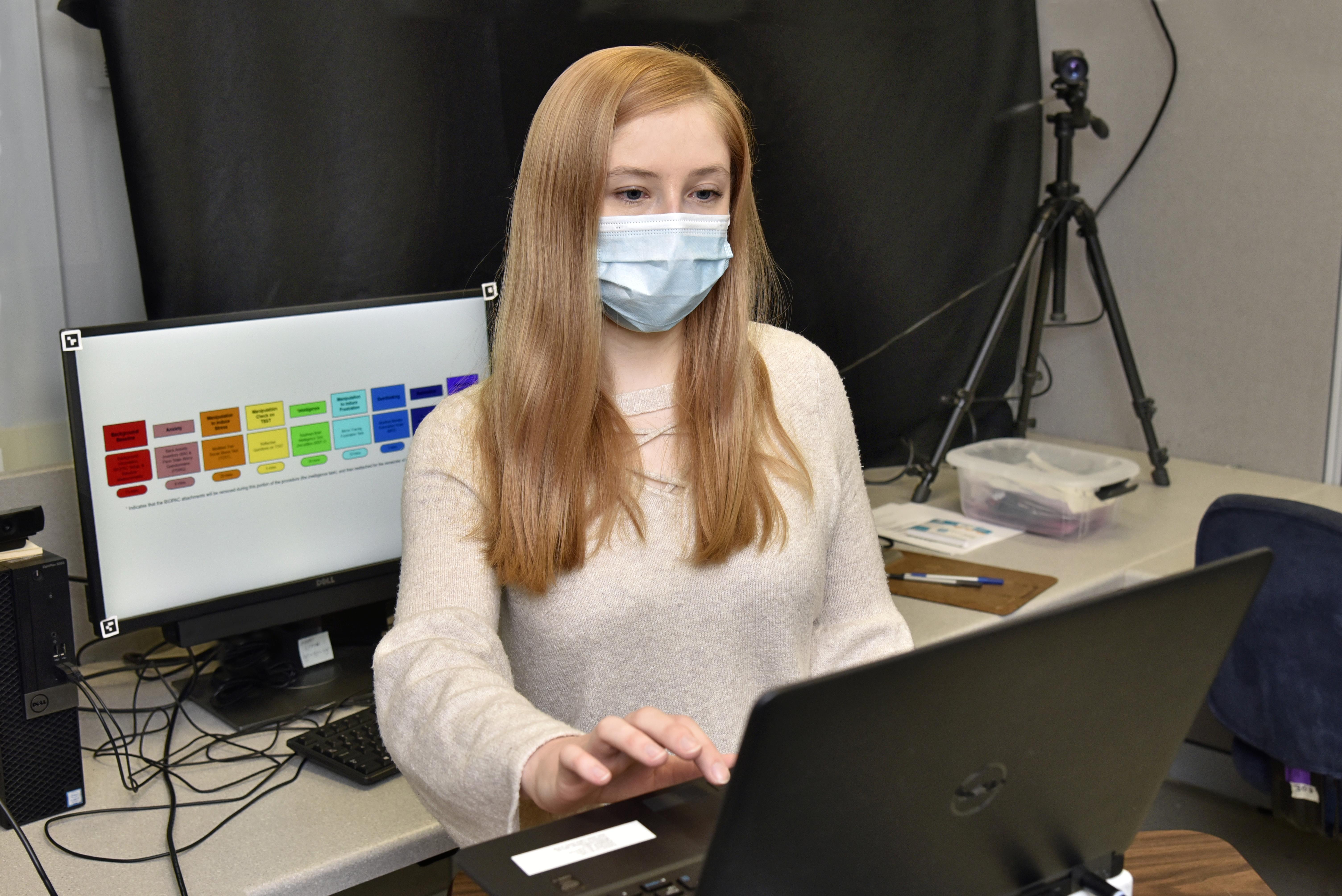Student researcher Quinn Ceilly works in a Mahar Hall psychology lab on her research project, which focuses on such common challenges as anxiety, overthinking and related issues that might deserve more exploration.
SUNY Oswego senior psychology and cognitive science major Quinn Ceilly’s current research project focuses on such common challenges as anxiety, overthinking and related issues that might deserve more exploration, with support from a campus grant.
A fall 2021 Student Scholarly and Creative Activity (SCA) Grant for “The Costs and Benefits of the ‘Hyper Brain’: How Intelligence, Anxiety, Overthinking and Rumination Interact” allows Ceilly to study “cognitive and physiological responses to short-term stress in order to further explore relationships between overthinking tendency, rumination and anxiety,” she explained.
“I have always been very interested in the human mind and how it operates, particularly in how physiological symptoms/responses to stress and anxiety can manifest in some individuals to a greater extent than others,” Ceilly noted.
Ceilly wants to explore these relationships – especially overthinking and anxiety, overthinking and rumination, and these three tendencies’ interrelationships – saying that these do not gain as much research attention as other topics like alcohol and drug use and matters like depression.
For this purpose, Ceilly defines as the recurring consideration of emotions and their causes, while contemplating various potential negative outcomes while responding to adverse feelings –- which, much like anxiety and overthinking, can be a popular sentiment, especially among college students.
In the Psychological Sciences Laboratory in 303 Mahar Hall, Ceilly works with student volunteers to study whether cardiac responses, such heart rate and heart-rate variability, correlate with different individuals’ tendencies toward overthinking and rumination. She will conduct these physiological tests during selected portions of the experiment.
“The experimental procedure consists of self-report measures of rumination, overthinking and anxiety,” Ceilly said. “In addition, two tasks will be presented that are designed to induce modest stressors. A mindfulness exercise will also be conducted at the conclusion of the study to encourage relaxation and a return to baseline after participants complete these moderately stressful tasks.”
Participants can receive $10 compensation for their participation and their time to acknowledge their contribution to this study. In addition, psychology students are able to sign up via the SONA research participation software tool, which allows them to receive extra credit in some psychology classes.
Creating better understanding
“The broader benefits of this research include a better understanding of anxiety, overthinking, rumination and associated physiological symptoms and their interrelationships in individuals who have a tendency to overthink,” said Ceilly, an Oswego County native and graduate of Paul V. Moore High School in Central Square.
The hope is that this project can “advance and expand the research that offers new insight into why some individuals may experience anxiety, overthinking and rumination to a more extreme degree than others,” Ceilly added. “These results could heighten public awareness and perhaps facilitate more specialized support for these individuals.”
The research can also help develop a better understanding of cognitive and physiological responses to stress, which could lead to better developing techniques to help control “detrimental thoughts about one’s perception of their experiences, actions and performances in certain situations, as well as interventions that prevent further psychological distress,” Ceilly explained. “Better understanding the factors involved in both the perpetuation of and the control of physiological responses to acute stressors could allow for better interventions that promote health in the short and long term.”
Ceilly credited the “considerable support and guidance” from her faculty mentor in psychology, Dr. Leigh F. Bacher.
“It is very apparent that she is a lifelong learner, and I am very grateful that she has agreed to continue to work with me on my research project, even after retirement from SUNY Oswego,” Ceilly said. “I am excited to continue working with her as we move forward in the data collection and analysis stages in this research project.”
Bacher has been key in helping Ceilly narrow down her research project, providing literature to review, guiding abstract concepts into concrete topics and teaching her about finding valid and viable measurements.
“She is extremely knowledgeable in her field, and she is always open to discussing anything, from interview advice to answering academic questions to offering suggestions in response to more general inquiries,” Ceilly said. “She has also helped me to grow as a writer in the sciences and as a researcher, sharing with me relevant scholarly articles and other academic resources that outline how to achieve effective and concise scientific writing, in addition to how to compile a successful research proposal and project.”
For information on volunteering to participate in this project, email qceilly@oswego.edu.
Other funded fall 2021 Student Scholarly and Creative Activity grants included:
- “Concurrent Symbolic Integration” by Dominic Altamura, with faculty mentor Ioana Coman, computer science;
- “Using Automated Recording Units to Study Northern Cardinal Vocal Behavior" by Brooke Goodman, with faculty mentor Daniel Baldassarre, biological sciences;
- “Estimating the Detection Rate of Strix Varia Over the Course of a Spring Snowmelt Event” by Jamie Perrin, with faculty mentor Nicholas Sard, biological sciences;
- "Boys Can Wear Pink, Too!” by Justin Fischnich with faculty mentor Ritu Radhakrishnan, curriculum and instruction
For more information on these and other funding opportunities to support scholarly and creative activities, visit the Internal Grants website for Office of Research and Sponsored Program.




